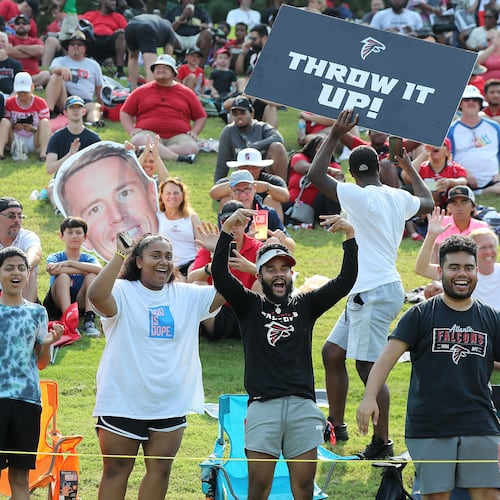For the first time in a month the Falcons can’t depend on the opposing quarterback’s mistakes.
It won’t be Arizona’s Drew Stanton or Cleveland’s Brian Hoyer throwing wayward passes to them at the Georgia Dome. The Falcons won’t face eight-game wonder Josh McCown in Tampa Bay or beat-up Cam Newton in Carolina.
Instead the Falcons will be confronted Monday night by quarterback Aaron Rodgers, Green Bay’s MVP candidate. They’ll be at Lambeau Field, where the Packers have been nearly unstoppable this season while winning all six games and scoring 25 offensive touchdowns.
The Falcons (5-7) are peaking with three victories in their past four games, and the defense has shown modest improvement. But they’ve yet to see anything like the Packers (9-3) and their quarterback.
“It’ll be a big challenge for us this week with Aaron Rodgers, who without a doubt is probably playing the best of any quarterback in the NFL right now, and he has a number of weapons that he can get the ball to,” Falcons coach Mike Smith said. “They’re playing extremely well at home. I don’t believe they’ve thrown an interception at home this season, and I don’t even want to talk about how many points they’ve scored in the last three games there at Lambeau Field.”
Rodgers has NFL-record streaks of 360 consecutive passes at home and 31 touchdown passes in a row without an interception (his last pick at home came in 2012). The Packers have scored 134 points in their past three games at Lambeau Field, including four return touchdowns.
The Packers have the league’s best quarterback. They have backs who can run with power and catch passes. They have explosive wide receivers who break tackles and a tough offensive line that’s playing well together.
“You guys are really taking me down on this,” Falcons defensive coordinator Mike Nolan said wryly as reporters queried him about how his unit can meet so many challenges against the Packers.
It all starts with Rodgers. He’s smart, accurate, tough, athletic and in total command of coach Mike McCarthy’s version of the West Coast offense.
Rodgers was MVP of the Super Bowl after the 2010 season and was voted Associated Press and Pro Football Writers of America MVP for the 2011 season. He’s been a worthy successor to Brett Favre, Green Bay’s Hall of Fame quarterback, because of his ability and leadership.
“The guys (teammates) know how much I care about it, how I love to compete, but I think they also see the preparation,” Rodgers said. “I like to be the most prepared guy in the offensive room and making sure those guys are getting ready themselves. Bring a positive attitude and a positive energy all the time — as a quarterback, I think that’s one of the hats you wear. You have to bring enthusiasm and energy to practice situations to get guys going. I watched Brett do that for years, and I try to bring the same kind of energy.”
Statistically, Rodgers’ season has been comparable with his MVP season.
Rodgers leads the NFL in passer rating (118.6), yards per attempt (8.8) and completions of 40 yards or longer (14). He’s tied for fourth with 45 completions of at least 20 yards and a higher percentage of Rodgers’ completions have gone for first downs (41.8 percent) than any other NFL starter.
The best statistical ranking for the Falcons’ defense this season has been interception percentage (3.24, ninth-best in the league after Week 13). But Rodgers has the NFL’s best interception percentage this season (0.8) and all-time (1.6).
Rodgers has kept his interceptions to a minimum even as his game has evolved from being “tighter and mechanical” to more free-flowing, Nolan said.
“(What) looks Favre-like is his ability to not be so concerned with making it look so prototypical and perfect,” Nolan said. “He plays ball. He’ll flick the ball from wherever he is, whether the ball is low or high or he’s in trouble or running off a back foot. He will keep it alive instead of ‘sit, throw it just right.’ As Brett would do, he’ll throw it underhanded or whatever. That’s what I see has really made his game wide open.”
About the Author
Keep Reading
The Latest
Featured


